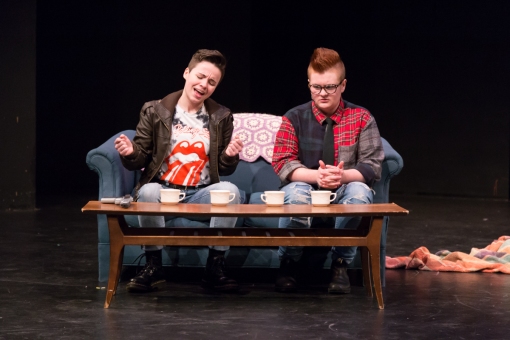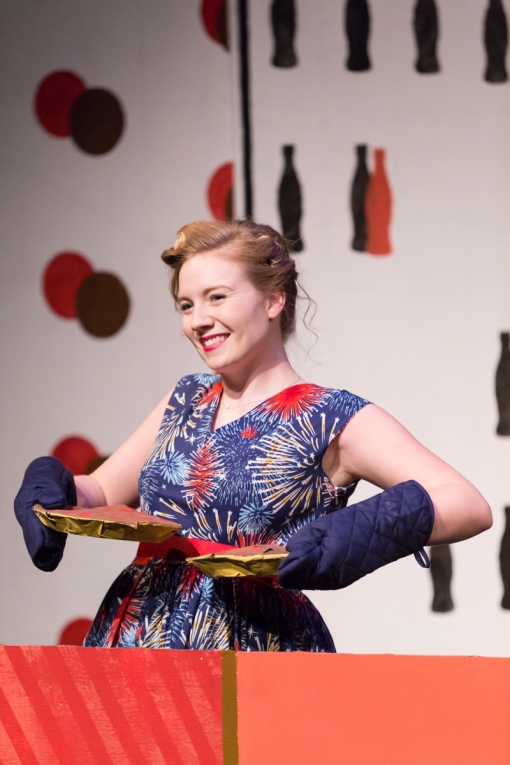by Greg Everett

Toilet Assistant Bobby Strong (Lucas Tapley) leads the revopootion—or is that upeeheaval?—in STU Musical Theatre’s production of Urinetown.
Drums riff and instruments trill as we enter the theatre for STU Musical Theatre’s production of Urinetown. There are dirty, disheveled people on stage and looming in the entrances. As spectators continue to trickle in, so do these shabby deplorables taking positions on the floor and on the stairs that frame a rundown gated entrance and catwalk. It is difficult to tell whether the play has begun, where the line is between action and audience.
This is in keeping with “the Brechtian theatrical style that inspired Urinetown writers Greg Kotis and Mark Hollman,” explains director Tania Breen. The play is full of metafictional references and fourth wall breaks.
In Urinetown‘s dystopian reality, pollution and wastefulness have led to a water shortage; private toilets are outlawed, public toilets are privatized; and those who can’t front the dough to go are taken on a trip to Urinetown, a mysterious prison colony beyond the horizon. Caldwell B. Cladwell (Ben Smith) of the Urine Good Company, with the aid of governmental regulation, has established himself as the sole controlling interest in the toilet industry, employing operators like Penelope Pennywise (Georgia MacNaughton) to collect a steep fee from people in need of a pee. But when Toilet Assistant Bobby Strong (Lucas Tapley) watches his father carted off to Urinetown, he begins to question the justice of the status quo. And with the aid of Cladwell’s daughter Hope (Sydney Hallett) he leads a popular revolution against the tyranny of the toilet industry.
Although written in the mid-90s, Urinetown is, if anything, more relevant now than ever: the Arctic National Wildlife Refuge was opened to oil drilling at the end of 2017 and the FCC’s vote to repeal Net Neutrality just became official. Those are just two major examples from the past three months that are part of a sweeping trend toward the expansion of corporate interests disregarding the well-being and rights of the individual and the world at large. On the other side of the coin, Kotis and Hoffman also examine the dangers of unbound idealism and anarchic socialism, which are also increasingly relevant, if less tangibly so.
However, in spite of its lofty Brechtian ideals and its social relevance, Urinetown falls considerably short in terms of message and effect. It relies on its strengths as a comedy to gloss over its unnuanced and negative approach to the revolution, whose members go from meek and oppressed to unstable and violent almost as soon as they decide to resist and seize power. Conversely, the murders committed by the corporation are grim and weighty while the onstage slaughter of politicians, executives, and their relatively innocent assistants is rushed and lackadaisical. And the ending comes across as Ayn Rand-ish: the moral appears to be that Cladwell and the UGC are necessary evils that must be bargained with.
There is a hint of real complexity at the end of the first act when through free and unregulated usage the public toilet breaks down and cannot be fixed, presumably because the people with the funding and skill set have been overthrown. But this is a loose end that remains untied as the revolution moves from the street to the underground. In terms of politics, the show is ultimately weak.
But in terms of performance, STU Musical Theatre’s production is impeccable, aside from some of the staging. From a side-seat in the thrust-configured Black Box, much of the blocking feels awkward and it’s possible to see behind the wall of Public Amenity No. 9, peeking at setups and entrances that are meant to be unobserved. Otherwise, the choreography of Courtney Arsenault is delightful. The costuming and makeup is functional and fun. Breen makes excellent use of the ensemble to create frantic action and great comedy.
And kudos to Miguel Roy and Georgia MacNaughton, as Officer Lockstock and Penelope Pennywise respectively, for delivering fantastic performances.
Produced by STU Musical Theatre, Greg Kotis and Mark Hollman’s Urinetown ran February 21-25, 2018 in STU’s Black Box Theatre.



